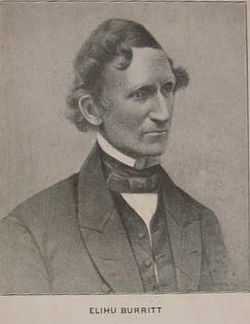Elihu Burritt

Elihu Burritt (December 8, 1810 – March 6, 1879) was an American diplomat, philanthropist and social activist.
Biography
He was born December 8, 1810, in the town of New Britain, Connecticut.
Descendant of William and Elizabeth Burritt from Stratford, Connecticut. http://www.genealogycentral.net/index_files/Page608.html He was active in many causes, namely opposing slavery, working for temperance, and trying to achieve world peace. These accomplishments caused President Lincoln to appoint him as United States consul in Birmingham, England.
He published at least 37 books and articles, including Sparks from the Anvil and Ten Minute Talks. In 1847, his pamphlet A Journal of a Visit of Three Days to Skibbereen made residents of the United States more aware of the potato famine in Ireland.
He possessed an extraordinary aptitude for languages which allowed him to attain his marvelously rapid mastery of them. He first trained as, and followed the occupation of blacksmith. His remarkable mental traits in combination with his continued pursuit of the blacksmiths' craft (particularly when short of cash) earned for him the title "Learned Blacksmith."
During his time in Birmingham he lived in a modest house in the then still rural village of Harborne to the west of the city. The house which he named New Britain Villas still stands. He was actively involved the local community, taking part in the committee for the rebuilding of the nearby St. Peter's Church. He recorded his thoughts on the industrialization of communities in the nearby Black Country in his book, Walks in the Black Country.
During a trip abroad in 1846–47, he was deeply touched by the suffering of the Irish peasantry. In 1848, he organized a precursive entity to the League of Nations and the United Nations called the first international congress of the Friends of Peace, which convened in Brussels in September 1848. A second "Peace Congress" met in Paris in 1849, presided over by Victor Hugo. Burritt attended the "Peace Congresses" at Frankfurt in 1850, London in 1851, Manchester in 1852 and Edinburgh in 1853.
The outbreak of the Crimean War and the American Civil War jolted his senses. He realized that his conceptions of universal brotherhood and international arbitration were not making an impression on the leaders of nations.
Burritt advocated that Britain, which introduced the uniform penny post in 1840, should introduce an international "ocean penny post" and reduce the cost from one shilling (12 pence) to threepence. He argued this would increase international correspondence, trade, and hence universal brotherhood. He urged the use of illustrated propaganda envelopes. Postal rates were gradually reduced, but his objective was not entirely achieved in his lifetime.
Elihu Burritt died on March 6, 1879 in New Britain.
See also
Sources
Each August the Town of New Marlborough, Massachusetts hosts an annual crafts and community fair in honor of Elihu Burrit. Elihu Burritt resided in the Berkshire County Town in 1830.
External links
| Wikisource has the text of a 1911 Encyclopædia Britannica article about Elihu Burritt. |
- Works by Elihu Burritt at Project Gutenberg:
- Journal of a Visit of Three Days to Skibbereen, and its Neighbourhood
- A Walk from London to John O'Groat's
- Elihu Burritt Bicentennial Events at Central Connecticut State University
- Twenty Reasons for Total Abstinence from Slave-Labour Produce (185-) - at the Antislavery Literature Project
- Contents of the Elihu Burritt Archives at the Elihu Burritt Library
- Works by or about Elihu Burritt in libraries (WorldCat catalog)
- Walking with Elihu, poems on Elihu Burritt, the Learned Blacksmith by Taylor Graham on Amazon.com
|